| Spotlight
Learning through Research
Zahidul Naim Zakaria
Photos:
Zahidul Naim Zakaria
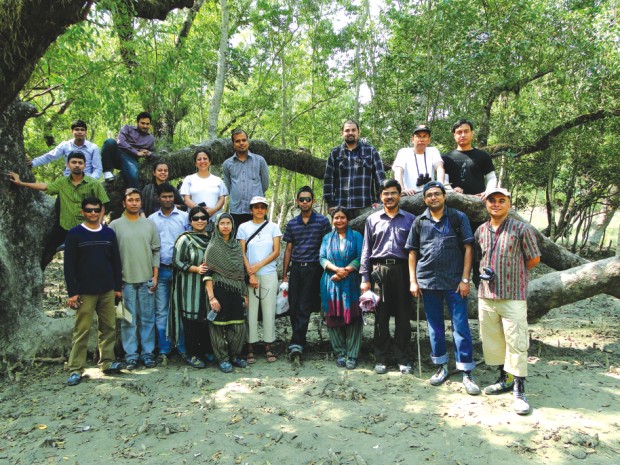
Everything is relative, including that which is considered common knowledge. Education evolves with time as theorists and academicians improve and build on existing knowledge and each discipline becomes richer and more diverse. Their findings are internalised in curricula and new knowledge, over time, becomes commonplace. And this enrichment is only possible through academic research. What we know today is not even remotely comparable to what we knew two decades ago, and over time, research tools, methods and data analysis software have become more sophisticated and in many cases, more easy to use. With newer areas of multidisciplinary work and newer global problems, the scope of research is expanding. Research output can serve as crucial input in policy making, and in simply testing which strategies are better than others. Universities and independent research bodies globally share such beliefs, and they support those that pursue research and knowledge building.
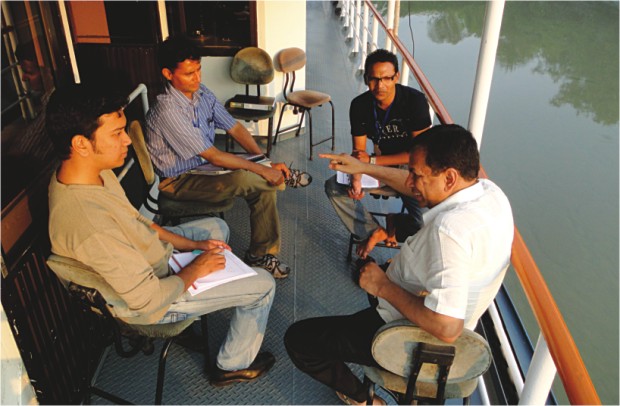
A one-on-one discussion with Dr. A.K. Enamul Haque.
The South Asian Network on Development & Environmental Economics (SANDEE) and Economic Research Group (ERG) are two such organisations who jointly organised a research workshop on Natural Resource and Environmental Economics in Bangladesh. The workshop was held on a cruise boat travelling towards the Sundarbans. It was for five days, 2-6 March 2011, and one day was spent in sightseeing and exploring the forest. Sundarbans being simply the venue and not the focus of the workshop, the workshop was about environmental economics in general. It was truly a meeting of intellectual minds, teachers and students where research concepts were stripped to their bones and their impracticalities were revealed. SANDEE funds research work that is internationally competitive and assists researchers to develop their research ideas for funding and for publishing the output in journals. Researchers from various South Asian countries including Nepal, India, Bangladesh, Mal Dives, Sri Lanka and Pakistan have carried out research under SANDEE grants.
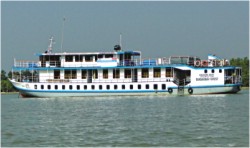 |
The workshop's mobile venue -the M.V. Aboshar of the Guide Tours Ltd. |
The primary purpose of the workshop in Bangladesh was to build capacity in Bangladeshi researchers so that they can compete in the international arena, defend research concepts and win research grants. The workshop had a special emphasis on proposal writing.
The workshop began with Dr. A. K. Enamul Haque, Research Director at ERG and Professor at United International University, discussing the basic premise of research in Economics. He discussed the importance of underlying Economic theory since research methodology has to be built upon theory and it has to correspond to relevant literature. Economics as a subject uses a framework of analysis based on transactions between consumers and producers and so the analytical framework for a good research concept must be linked to this framework. Economics usually starts from the point of view of consumers or from the point of view of producers. However, this does not mean that research is restricted within the parameters of demand and supply.
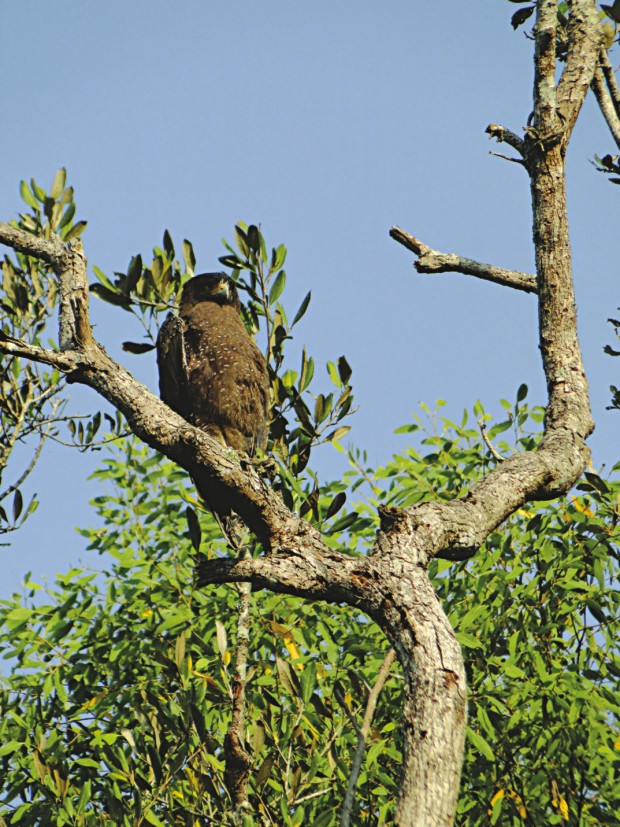
The proposal writing process and the overall do-s and don't-s of research work was discussed at the workshop. Dr. Priya Shyamsundar, Programme Director of SANDEE, stressed the need to make the research interesting and for it to have a clear message or question that is logical and succinct. Above all, she urged researchers to try to tell a story, and not present facts without being able to connect them and develop the context. She stressed the need for good English in order to be able to communicate ideas coherently for international reviewers to comprehend.
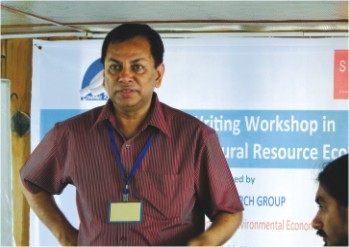 |
Dr. A.K. Enamul Haque discussing the basic framework of research in Economics. |
Prior to the workshop, interested participants were asked to submit research concept notes within the boundaries of Natural Resource and Environmental Economics. Fourteen participants were selected for the workshop, who were either faculty
members at public and private universities or research associates at research organisations and think-tanks. Research concepts selected for the workshop dealt with migration, soil salinity, value lost due to environmental pollution, fisheries, and various issues connected to climate change (such as intra-household food allocation, firm/ labour productivity and food security).
Dr. Pranab Mukhopadhyay, Associate Professor at Goa University of India, discussed the Literature Review process with the participants. Before the review of relevant literature begins, researchers must choose wisely as to what is 'relevant'. And a paper is relevant not only for the issue that they deal with, but more importantly, for the methodology used. The existing literature is what provides the basis for arguing the viability of a research concept.
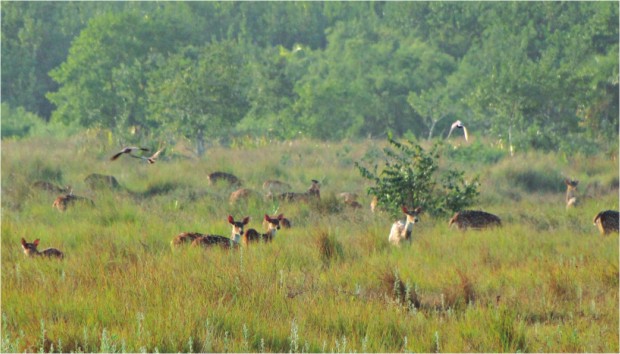
A herd of spotted deer near Kotka beach at Jamtola, Sundarban.
Survey methods were discussed by Dr. Mohammed Ziaul Haider, Associate Professor and Head of Economics, Khulna University. He also presented the elements of a good questionnaire. Sampling techniques were also talked about. He urged everyone to train enumerators properly since, in a research work using primary data, the lack of accuracy of the survey will make the research results void.
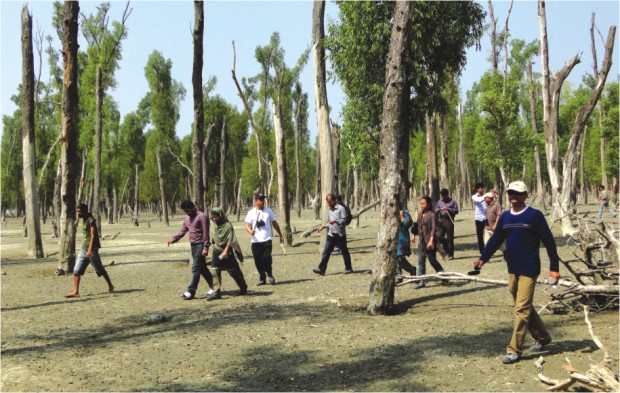
Trekking in the Sundarban forest's less dense parts.
It was very interesting to hear about an actual research project from Dr. Mani Nepal, Sr. Environmental Economist of SANDEE and Associate Professor at Tribhuvan University of Nepal. He discussed minute details regarding econometric modelling, estimation and interpretation of results. The paper looked into finding the value of information in making a distinction between tube wells in Bangladesh that are arsenic contaminated and those that are not (red wells and green wells). As the research found, information did make a difference to many families and knowing the difference pushed them to switch, often at a greater cost. But, the research also discovered that many families still do not fully understand the distinction between red and green tube wells and some families simply don't react as they do not have alternative water sources. The problem with arsenic is that the impact is not instantaneous, and many villagers often don't worry too much about long-term risks.
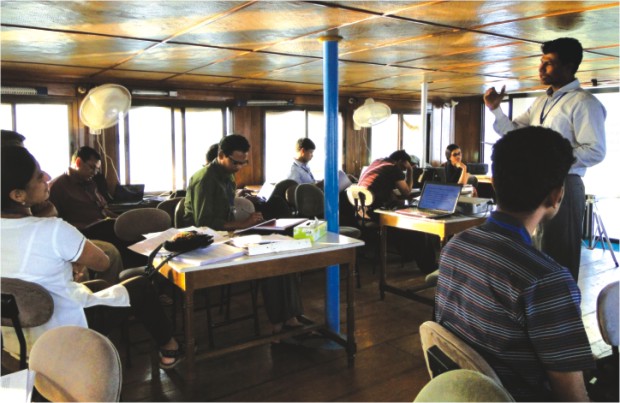
Research concept note being presented.
The fourteen participants were led through the Sundarban forests after the first session of the workshop, which was held during the two day journey from Narayanganj to the Sundarban forest on a cruise ship. One day was spent in sightseeing and exploring the wilderness in the company of two forest guards and a very well-informed guide. As the participants walked through the forest and marvelled at the greenery, birds and animals of the Sundarbans, they had the time to think and redesign their research concepts in their minds. On return to the ship after a recreational day, everyone went straight back to work. The next day, the ship would start its journey back and the second phase of the workshop would be underway where each member would present their concepts again. Armed with comments and suggestions, each concept was revised. The second round of presentations was much better, with greater confidence and with more practical ideas. But, as the resource persons reckoned, there was still a lot of work left to be done. The participants were encouraged to send in full-fledged proposals to SANDEE in the future.
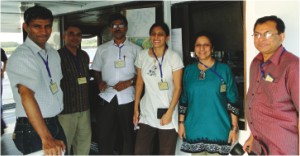 |
(From left) Dr. Mani Nepal, Dr. Pranab Mukhopadhyay, Dr. Mohammed Ziaul Haider, Dr. Priya Shyamsundar, Anuradha Kafle and Dr. A. K. Enamul Haque. |
Above all, the most important learning that participants took away from the workshop was the appropriate dimension of academic research. Understanding how specific the research question needs to be appeared to be a perennial problem with almost every single one of the participants. Mostly, they attempted to answer a question that was either too broad or too vague. For example, one study cannot investigate the impact of a given natural calamity on tourism, agriculture and fishing, unless it is undertaken by a large team with considerable resources.
This topic includes three studies at least, if not more! Research, in order to produce incontrovertible results, needs to answer specific and sharp questions. The research question needs to be appropriate given the context, it should be answerable given an understanding of theory and the methods to undertake the research need to be clear. Above all, these different components have to come together and tell a cohesive story. Research should ideally be specific enough to have a policy handle.
There is a tremendous need to build both the will and the capacity to do research in Bangladesh. Private Universities in our country hardly stress on research work. State regulation could play a vital role in this regard. But, unfortunately in Bangladesh, the regulator would rather push universities to gather more land and build their own campuses rather than push faculty members to engage in research. In a competitive world, acquisition and creation of new knowledge is an important requirement of economic progress. This can only be done if universities are required to publish research works regularly. Universities could be made to have a financial requirement that they must pledge as research funds. But until such actions are taken, we can only hope that independent research bodies such as SANDEE, ERG and others can give Bangladeshi and South Asians researchers a fighting chance to catch up with the academics of the rest of the world.
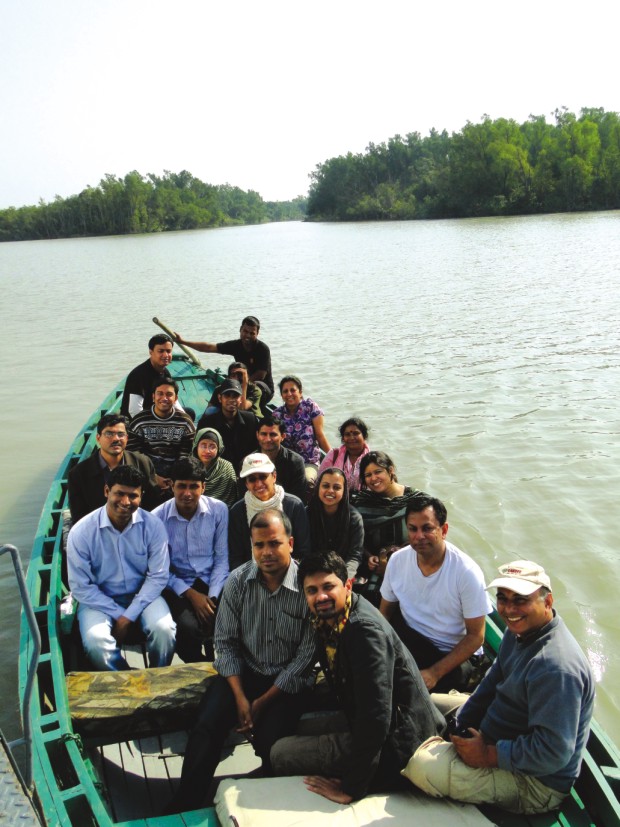
Heading into the forest.
|
Copyright (R) thedailystar.net 2010 |

